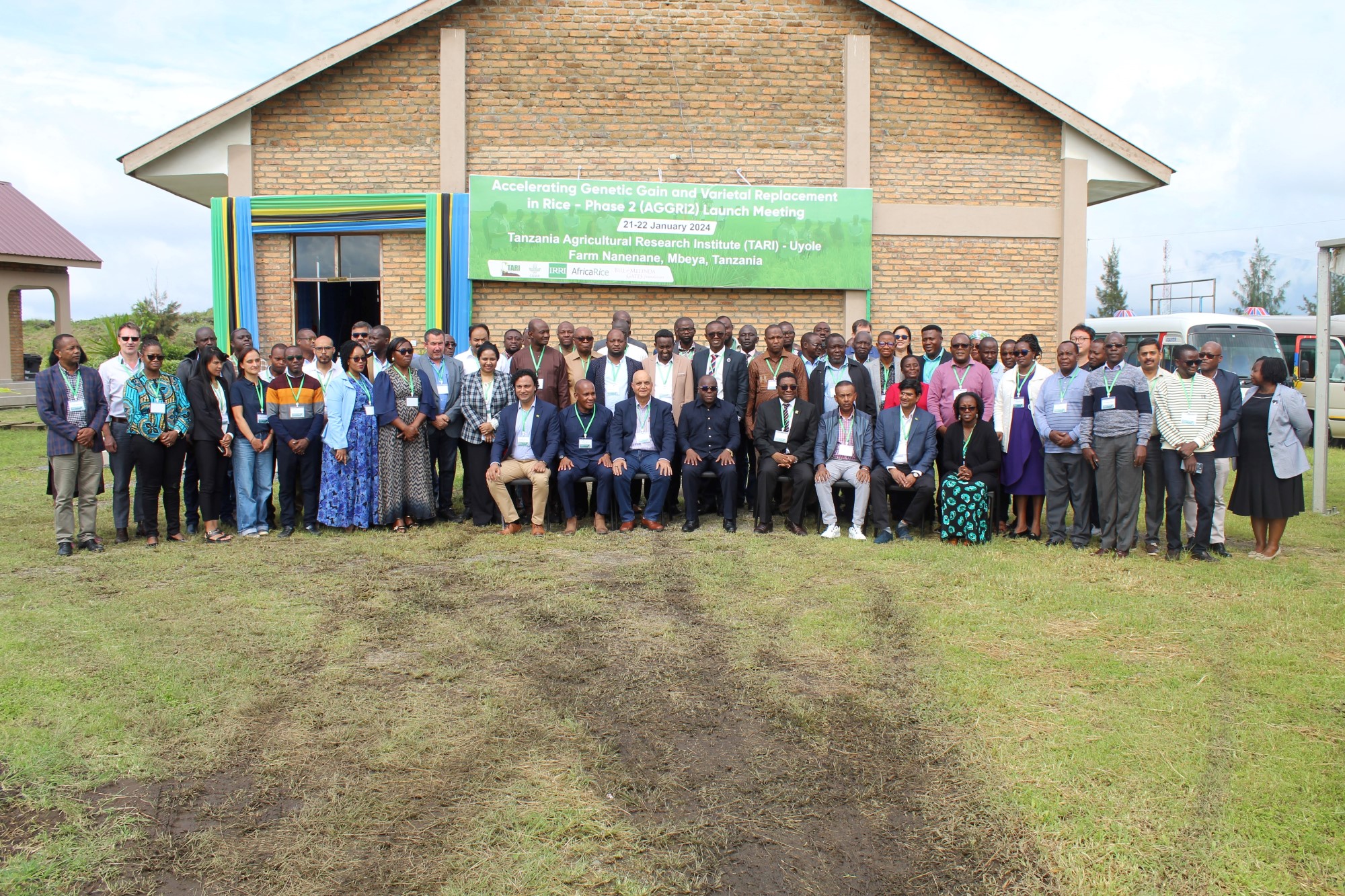IRRI and AfricaRice collaborate on developing and delivering improved and localized rice varieties to smallholder farmers in Africa

As a continuation of accelerating and modernizing the breeding programs through the Accelerating Genetic Gain in Rice (AGGRi) Alliance initiated in 2019, the second phase of AGGRi (AGGRi2) was launched in the Nanenane farm of the Tanzania Agricultural Research Institute (TARI)- Uyole last January 22, 2024. The AGGRi Alliance was formed to unify modern rice breeding efforts in South Asia and the African continent.
After the successful completion of the first phase of the AGGRi Alliance project in South Asia and East and Southern Africa (ESA) from 2019 to 2023, the Bill and Melinda Gates Foundation (BMGF) has shifted its focus to Sub-Saharan Africa (SSA) for the phase 2 of AGGRi. With the International Rice Research Institute (IRRI) and AfricaRice at its helm and the support of the national agricultural research and extension systems (NARES) partners from SSA, the initiative aims to respond to the rising food security needs of rice-producing African countries.
Agricultural productivity across crops in SSA is low and rice consumption is increasing faster than that of any other food staple in SSA at about 6% per year, with only about 60% of rice consumption being satisfied by domestic production. While several challenges contribute to the low rice productivity, low adoption of the improved high-yielding climate-resilient varieties and minimal use of quality seeds remain some of the major challenges in the rice sector in SSA. This situation poses a threat to the region’s food security thus, warranting focused and continued interventions from governments, local and international research organizations, developmental agencies, scaling partners, and donors.
“The AGGRi2 project is a manifestation of the continuing impact of IRRI’s rice breeding strategies”, said Dr. Hans Bhardwaj, Director of Rice Breeding Innovations (RBI) at IRRI. He further shared that he hopes that this collaboration between IRRI, AfricaRice, and the NARES partners from SSA can greatly help elevate the food security and nutrition situation of the African continent.
AGGRi2 is BMGF's investment in CGIAR's rice breeding and seed delivery work. This project builds on the accomplishments of previous BMGF projects such as Stress Tolerant Rice for Africa and South Asia (STRASA), Transforming Rice Breeding (TRB), and the AGGRi Alliance [Phase 1]. This second phase aims to develop and deliver improved rice varieties that respond to the needs of smallholder farmers in the SSA region. AGGRi2 is well aligned and linked to the CGIAR's Market Intelligence, Accelerated Breeding, and Seed Equal initiatives. “There were a lot of best practices to be learned in terms of rice breeding, nutrition, and social equity from STRASA and TRB. We hope to bring these lessons from Asia to Africa and see how we can formulate localized strategies from there onwards”, shared Dr. Sankalp Bhosale, Deputy Director of RBI at IRRI and Project Lead of AGGRi2.
During the event, visits were organized to the breeding trial sites and farmers' fields to showcase TARI’s ongoing activities in rice research, development, and extension in the Mbeya around 28% of the country’s gross domestic product (GDP).
The late Dr. Geoffrey Mkamilo, former Director General of TARI, launched the “TARI-IRRI Joint Strategic Work Plan for Rice: 2024-2030" during the AGGRi2 launch. “It is the first time that TARI has developed a national strategic roadmap for any agriculture value chain to support region. The visit and the farmers' discussion brought huge potential for the rice sector in the Mbeya region. His Excellency Honorable Mr. Juma Homera, the Regional Commissioner of Mbeya, formally opened the AGGRi2 launch meeting sharing that the Tanzania government is fully supportive of its agricultural sector. It is important to note that Tanzania is the second leading rice producer in ESA. Moreover, it boasts of an agricultural sector that has contributed priority setting, budget formulation, and allocation, as well as a monitoring and evaluation framework”. He acknowledged and thanked IRRI for its immense support in developing this strategic work plan for rice. Dr. Mkamilo also advised the use of this strategic framework designed for rice to develop strategic roadmaps for other agriculture value chains to improve the efficiency of research and delivery in TARI, which ultimately will help smallholder farmers boost their livelihood through the transformation of the agriculture value chains in Tanzania.
The meeting concluded with a virtual message from Dr. Gary Atlin, BMGF's Senior Program Officer. He said that AGGRi2 will have a major focus on SSA with IRRI as the lead grantee and AfricaRice as a co-lead CGIAR center. He also stated that AGGRi2 is fully adopting the inputs from the joint breeding networks with NARES and CGIAR teams. The initiative aims to be more inclusive and localized by jointly deciding on what market segments to prioritize, which products to deliver, and how the network can leverage each other's strengths to deliver varieties that target the needs of smallholder SSA farmers. AGGRi2 is aligned with and will follow the Global Rice Breeding Program, a globally unified rice breeding program of CGIAR guiding rice breeding at IRRI, AfricaRice and Alliance Bioversity, and CIAT (ABC).
Also present at the event were Dr. Ajay Panchbhai, the Regional Breeding Lead for IRRI-Africa, Dr. Rosemary Murori, Breeder and Country Representative for IRRI Tanzania, Dr. Negussie Zenna, Highland Rice Breeder at Africa Rice Center, Dr. Saidu Bah, Seed Unit Coordinator at Africa Rice Center, Dr. Dennis Tippe, Center Director at TARI-Uyole, and Dr. Atu Bilaro, Breeder at TARI-Uyole. In addition, the meeting included all leading subject matter experts from IRRI, AfricaRice, and One CGIAR initiative teams (Market Intelligence, Accelerated Breeding, and SeedEqual).
This launch was hosted by the Tanzania Agricultural Research Institute (TARI) in collaboration with IRRI and AfricaRice. Moreover, the AGGRi2 launch is the first global rice event in Mbeya that was participated by more than 80 participants with 27 different nationalities from Africa and Asia. Representatives of National Agricultural Research and Extension Services (NARES) from 22 African countries were present at this AGGRi2 launch event, with virtual participation from the BMGF.


